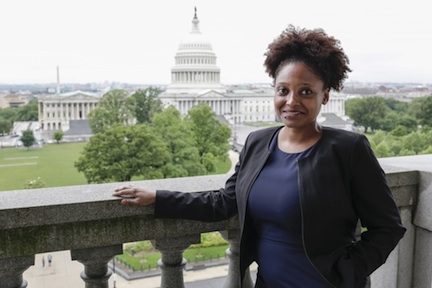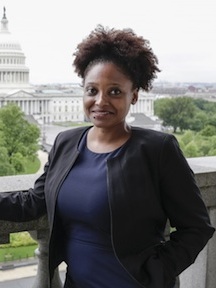
“As someone who has been sustained by poems and poets,
I understand the powerful and necessary role poetry can play
in sustaining a rich inner life and fostering a mindful, empathic,
and resourceful culture.”
— Tracy K. Smith
By William Harren
Since its founding, Phi Beta Kappa has championed the liberal arts and sciences in large part because of the ways that curiosity, discipline, and creativity enrich our lives. This enrichment becomes particularly apparent when reading the work of Tracy K. Smith, the acclaimed poet, memoirist, and ΦBK member. Today, there are few other writers who offer a more apt demonstration of how ongoing intellectual enggement enhances our relationship with the world.
Born the youngest of five children in Falmouth, Massachusetts, April 16, 1972, Smith moved with her family to Fairfield, California, while she was still young. As a girl, Smith became enchanted by the magic of poetry, especially with the work of Emily Dickinson. In the fifth grade, she began writing her own poems, unknowingly taking the first steps toward a career that has now spanned over three decades. In 1990, Smith returned to the East Coast to begin her studies at Harvard University. While exploring a wide variety of topics and diverse academic disciplines, she continued her work in poetry and joined the Dark Room Collective, an influential workshop for poets of color, while simultaneously taking the opportunity to study under such notable authors as Seamus Heaney. After graduating from Harvard, Smith continued to study and to write, earning an MFA from Columbia University and receiving a Stegner Fellowship from Stanford University.
Today, Smith teaches creative writing at Princeton University and has published four books, including three collections of poetry and a memoir, Ordinary Light (2015). Her fourth book of poetry, Wade in the Water, is forthcoming in April 2018. She has been the recipient of many awards including the Cave Canam Poetry Prize, the Whiting award, the Academy of American Poets Fellowship, and a Pulitzer Prize for her 2012 collection Life on Mars. All of these accomplishments and honors have lead to Smith’s most recent appointment as Poet Laureate of the United States of America.
In an interview with the New York Times, Toi Derricotte, fellow poet and board-member for the Academy of American Poets, commented on the recent appointment, saying: [Smith has] been remarkable as a citizen in the community of poets … [as Poet Laureate] she’ll change a lot of people’s ideas about poetry”. Yet, even as this new appointment enhances Smith’s public presence, her written work and her direct connection with the audience still remain her most impressive accomplishments. With her diverse exploration of form, she manages to leap across great distances, closing the space between the spiritual and mundane, between popular culture and private experience, and most importantly, the space between reader and writer. Perhaps this is the reason why, in an interview with NPR, Smith declared her intentions as Poet Laureate, saying, “I think the responsibility really is to just help raise the awareness of poetry and its value in our culture.”
Above all, Smith believes in the incredible facility of poetry and language to empower and engage people. In a short opinion piece for the New York Times, she makes these fidelities clear:
“We all believe this on a certain level, don’t we? We speak vows aloud, tell ourselves what we want, doom ourselves to failure, urge ourselves to the finish line all because, on a fundamental level, we understand that words invite possibility.”
In her new position as Poet Laureate, Smith will have the opportunity to use her words in a host of new ways, inviting possibilities for the future, bringing new members into the national circle of poets and poetry readers even as she continues to inspire long-time patrons of the liberal arts.
William Harren recently graduated from College of Saint Benedict and Saint John’s University where he majored in philosophy. These joint institutions are home to the Theta of Minnesota Chapter of Phi Beta Kappa.
Tracy K. Smith became a member of Phi Beta Kappa at Princeton University in 2012. Photo by Shawn Miller, Library of Congress.




